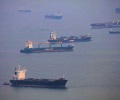

A vessel that may have been hijacked off the coast of Fujairah near the Strait of Hormuz is safe after boarders left the ship, UK Marine Trading Operations, or UKMTO, said Aug. 4, as tensions continue to simmer in the region over the safe passage of shipping.
“Boarders have left the vessel. Vessel is safe. Incident complete,” UKMTO said.
UKMTO — which supports the UK’s naval presence in the region – said on Aug. 3 a vessel sailing about 61 nautical miles from Fujairah may have been hijacked, without providing further details.
Maritime and security sources had identified the vessel as the Asphalt Princess.
The Port of Fujairah — located just outside the Persian Gulf on the East Coast of the UAE — is a major bunkering hub at the entrance to a waterway where approximately 18 million b/d of crude are shipped, mostly to markets in Asia.
The incident didn’t move markets. NYMEX September WTI settled down 70 cents at $70.56/b and ICE October Brent declined 48 cents to $72.41/b on Aug. 3. Platts Dated Brent crude was assessed at $73.395/b on Aug. 3, down 0.75%.
Repeated attacks
The incident comes in the wake of a deadly July 29 drone attack on an unladen oil products tanker, Mercer Street, which was headed to Fujairah in the UAE to load diesel for delivery into East Africa.
The US, the UK and Israel blamed Iran for the strike on the Israeli operated tanker, which Tehran has denied, and shippers operating in the region are on high alert for any retaliatory measures.
In a similar incident, Lori, an Israeli-owned container ship, was attacked in the Arabian Sea on March 25.
“An escalating tanker conflict between Iran and Israel highlights the small but real risk that an eventual confrontation disrupts oil supply or transit,” Paul Sheldon, chief geopolitical advisor at S&P Global Platts Analytics, said in a note. “Israel will push back against security threats from Iranian proxies in Syria, Lebanon and Iraq, while Iran will likely try to respond forcibly to attacks on its ships and nuclear facilities.”
Iran-related risks
Iranian foreign ministry spokesman Saeed Khatibzadeh had called the Aug. 3 incidents “completely suspicious,” warning not to draw any false conclusions for political purposes.
Tensions are high in the Middle East at a time when hardliner Ebrahim Raisi is set to take office as Iranian president, and nuclear talks with the US remain in limbo, without any sight of sanctions relief for Tehran’s energy industry. More than six weeks have passed since nuclear deal negotiations were suspended in mid-June, without much progress.
“Iran-related supply risks in the region, both direct and indirect, will likely increase in the months ahead,” said Sheldon. “In addition to maritime risks and tensions with Israel, Iran-backed groups in Iraq could step up attacks near US troops to accelerate a military withdrawal, while missiles from the Iran-backed Houthis in Yemen will continue to threaten Saudi oil facilities.”
A spate of attacks and attempted strikes on Saudi Aramco’s infrastructure by the Houthis in Yemen have also raised fears about the safety of vital oil infrastructure in the Middle East.
On July 27, Saudi forces intercepted an attack on the Red Sea city of Jazan, which Yemen’s Houthi militants targeted with ballistic missiles and booby-trapped drones.
Source: Platts